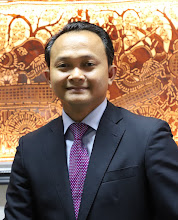ពាក្យ «កាតព្វកិច្ចឧត្តមជន» (noblesse oblige) នេះមានប្រភពដើមពីភាសាបារាំង និងជាផ្នត់គំនិតទូទៅនៅអឺរ៉ុបដែលគេសំដៅទៅលើតួនាទីរបស់ត្រកូលអភិជន (noble) ក្នុងការតបស្នង និងទំនុកបម្រុងសង្គម។ កាតព្វកិច្ចឧត្តមជន មិនមែនជាការទទួលខុសត្រូវខាងផ្លូវច្បាប់ទេ តែជាមនសិការខាងសីលធម៌ទូទៅសម្រាប់អភិជន ឬឧត្តមជន។
ពាក្យ «កាតព្វកិច្ចឧត្តមជន» ត្រូវបានបង្កើតឡើងដោយអ្នកនយោបាយបារាំង Pierre-Marc-Gaston de Levis (១៧៦៤-១៨៣០) ដែលជំរុញឱ្យមានកាតព្វកិច្ចផ្នែកមនសិការទៅលើបុគ្គលដែលមានឋានៈ តួនាទីខ្ពង់ខ្ពស់។ ទន្ទឹមនឹងការទទួលបានអភ័យឯកសិទ្ធិសង្គម បុគ្គលទាំងនោះត្រូវដើរតួជាគំរូ ឱ្យប្រដំប្រសងនឹងឋានៈសង្គមរបស់ខ្លួនដោយធ្វើការងារសប្បុរសធម៌ មនុស្សធម៌ ឬកិច្ចការនានាក្នុងបុព្វហេតុនៃការអភិវឌ្ឍសង្គមលើសពីការស្វែងរកផលប្រយោជន៍បុគ្គល។
ក្នុងសម័យទំនើបពាក្យនេះក៏ត្រូវបានគេបកស្រាយឱ្យទូលំទូលាយដោយមិនសំដៅតែទៅលើត្រកូលអភិជនដូចក្នុងសតវត្សរ៍ទី ១៩ នោះទេ។ ការបកស្រាយទូលាយទៅលើពាក្យនេះគឺចង់និយាយថា អ្នកដែលកើតឡើងក្នុងត្រកូលស្តុកស្តម្ភ ឬបុគ្គលដែលមានឋានៈខ្ពង់ខ្ពស់ក្នុងសង្គម ឬអ្នកមានឧបនិស្ស័យពិសេសពីធម្មជាតិ មានកាតព្វកិច្ចធ្វើកិច្ចការដែលបម្រើដល់សង្គមទូទៅលើសពីផលប្រយោជន៍បុគ្គលផ្ទាល់ខ្លួន។
ឧបមាថា បើយើងជាបញ្ញវន្តរៀនបានខ្ពង់ខ្ពស់ នោះយើងគួរដឹងខ្លួនឯងថាយើងជាបុគ្គលដែលមានទេពកោសល្យផ្នែកចំណេះដឹង ដូច្នេះត្រូវប្រើចំណេះដឹងនេះឱ្យជាប្រយោជន៍ដល់ការអភិវឌ្ឍសង្គម លើសពីផលប្រយោជន៍ផ្ទាល់ខ្លួន។ មនុស្សកើតមកមិនមានសមត្ថភាពដូចគ្នានោះទេ ដូច្នេះកាលបើយើងមានទេពកោសល្យអ្វីមួយលើសពីអ្នកដទៃយើងត្រូវចេះប្រើទេពកោសល្យនោះដើម្បីជាប្រយោជន៍សង្គម។ ទេពកោសល្យពីកំណើតមិនមែនសំដៅតែលើសមត្ថភាពចំណេះវិជ្ជានោះទេ អ្នកខ្លះអាចមានទេពកោសល្យពិសេសក្នុងការរកជំនួញជួញដូរ សិល្បៈវប្បធម៌ជាដើម។
ជាទូទៅអ្នកដែលមានសមត្ថភាពគឺអាចមានបញ្ញាញាណគ្រប់គ្រាន់ក្នុងការប្រកបរបរចិញ្ចឹមជីវិត ឬរកសេចក្តីសុខដល់ខ្លួនឯងបាន ប៉ុន្តែបើមានទេពកោសល្យលើសមនុស្សដទៃហើយបែរជាមិនប្រើទេពកោសល្យនេះឱ្យមានប្រយោជន៍ដល់សង្គមនោះបានន័យថា មិនបានបំពេញកាតព្វកិច្ចឧត្តមជន។ បើមានងារថា ជាអ្នកប្រាជ្ញ ប៉ុន្តែអ្នកប្រាជ្ញនោះមិនបានបន្សល់ទុកស្នាដៃអ្វីដល់សង្គមជាតិ តើមានឈ្មោះថាជាអ្នកប្រាជ្ញដើម្បីអ្វី? បើមានសមត្ថភាពខ្ពស់ហើយ តែសុខចិត្តទៅធ្វើការងារងាយៗស្រណុកៗដោយមិនបានប្រើអស់ទេពកោសល្យរបស់ខ្លួននោះគឺស្មើនឹងមិនបានបំពេញកាតព្វកិច្ចឧត្តមជន។
ឧបមាថា បើយើងកើតក្នុងត្រកូលដែលមានទ្រព្យស្តុកស្តម្ភមានអ្វីគ្រប់យ៉ាងទោះចាយប៉ុន្មានជំនាន់មនុស្សក៏មិនអស់ ប៉ុន្តែ បើយើងមិនបានបំពេញកាតព្វកិច្ចឧត្តមជនគឺយើងគ្រាន់តែមានឈ្មោះថា ទទួលកេរពីបុព្វបុរស មិនបានធ្វើអ្វីជាចម្រើនដល់សង្គមនោះឡើយ។ ផ្នត់គំនិត “កាតព្វកិច្ចឧត្តមជន” មានការអនុវត្តច្រើនណាស់នៅបស្ចិមប្រទេស។
ឧទាហរណ៍ងាយយល់គឺលោក អាល់ហ្វ្រេដ ណូបែល ដែលមានទ្រព្យសម្បតិ្តមហាសាល ហើយគាត់បានបង្កើតមូលនិធិដើម្បីផ្តល់ជារង្វាន់ណូបែល លើកទឹកចិត្តដល់អ្នកវិទ្យាសាស្ត្រដែលបានអភិវឌ្ឍអ្វីមួយថ្មី បម្រើដល់សេចក្តីសុខសាន្តរបស់មនុស្សជាតិ ឬអ្នកដែលធ្វើវិភាគទានដល់សន្តិភាពក្នុងពិភពលោក។ ប្រធានក្រុមហ៊ុន Microsoft លោក ប៊ីល ហ្គេត បានបង្កើតមូលនិធិទ្រទ្រង់ដល់សកម្មភាពកម្ចាត់ជំងឺស្វិតដៃជើង និងជំងឺគ្រុនចាញ់ជាដើម។
មានឧទាហរណ៍បែបនេះច្រើនណាស់នៅក្នុងសង្គមបស្ចិមប្រទេស។ ក្រុមហ៊ុនល្បីៗធំៗតែងតែមានបង្កើតមូលនិធិអាហារូបករណ៍ ឬមូលនិធិសម្រាប់ទ្រទ្រង់ដល់ការសិក្សាស្រាវជ្រាវជាន់ខ្ពស់ ដែលជាកត្តាជំរុញឱ្យមានការរីកចម្រើនផ្នែកវិទ្យាសាស្ត្រ និងបច្ចេកវិទ្យា។
តារាសម្តែង អេនជេលីណា ជោលី មានកេរិ៍្តឈ្មោះល្បីពេញពិភពលោក មានទ្រព្យសម្បត្តិស្តុកស្តម្ភ តើនឹងមានប្រយោជន៍អ្វីដែលគាត់ត្រូវទៅលំបាកលំបិនដើរទៅក្នុងតំបន់សង្គ្រាមក្នុងការងារជាទូតសុច្ឆន្ទៈសម្រាប់ជនភៀសខ្លួន ឬក៏ត្រូវមកជួយផ្សព្វផ្សាយវប្បធម៌ និងប្រវត្តិសាស្ត្ររបស់កម្ពុជានោះ? នេះហើយដែលគេហៅថា «កាតព្វកិច្ចឧត្តមជន»។
គួរឱ្យសោកស្តាយដែលនៅក្នុងសង្គមអាស៊ី ឧទាហរណ៍គំរូនៃការអនុវត្តកាតព្វកិច្ចឧត្តមជនក្នុងត្រកូលអភិជននៅមានកម្រិតតិចតួច។ ខ្ញុំតែងតែស្រមៃថា បើអភិជនរបស់កម្ពុជា ប្រកួតប្រជែងគ្នាក្នុងការបង្កើតរោងចក្រ បង្កើតការងារបង្កើតឧស្សាហកម្មថ្មីណាមួយដែលពុំធ្លាប់មានពីមុនមកក្នុងសង្គមជាតិខ្មែរ នោះមិនដឹងជាល្អយ៉ាងណាទេ។
បច្ចុប្បន្នអភិជនកម្ពុជាចំណាយលុយរាប់សិបលានដុល្លារទៅព្យាបាលជំងឺនៅក្រៅប្រទេស ដូច្នេះខ្ញុំក៏តែងតែស្រមៃដែរថា បើពួកគាត់ប្រកួតគ្នាបង្កើតមន្ទីរពេទ្យ ឬមន្ទីរពិសោធន៍កម្រិតអន្តរជាតិក្នុងស្រុកមិនដឹងជាសង្គមជាតិចងចាំគាត់ប៉ុនណាទេ។
តើយើងគ្រាន់តែចង់ឱ្យគេចងចាំថា យើងជាអ្នកមានទ្រព្យច្រើនបំផុតលើសគេ? ប្រើរបស់ថ្លៃបំផុតលើលោក? រស់នៅក្នុងវិមានធំបំផុតលើលោក? តើយើងគ្រាន់តែចង់ឱ្យគេចាំថាជាអ្នកដែលរៀនបានសញ្ញាបត្រច្រើនជាងគេ? ឬមួយក៏យើងចង់ឱ្យគេចងចាំថា គាត់គឺជាអ្នកនាំមកនូវសេចក្តីចម្រើនក្នុងវិស័យកុំព្យូទ័រ សុខាភិបាលស្រាវជ្រាវវិទ្យាសាស្ត្រជាអ្នកបង្កើតរោងចក្រផលិតអ្វីមួយដំបូងបំផុតរបស់កម្ពុជាជាអ្នកនាំមុខក្នុងការផ្តល់សេវាសាធារណៈជាបុគ្គលគំរូក្នុងការធ្វើកំណែទម្រង់ស្ថាប័នរដ្ឋជាអ្នកនាំចេញកសិផលកម្ពុជាទៅកាន់ទីផ្សារពិភពលោក ជាម្ចាស់ឧស្សាហកម្មខ្មែរដែលល្បីឈ្មោះក្នុងកម្រិតតំបន់ និងពិភពលោក?
កម្ពុជាឆ្លងកាត់សង្គ្រាមរ៉ាំរ៉ៃច្រើនទសវត្សរ៍ ដូច្នេះប្រហែលជាតថភាពសង្គម «ប៊ិះរស់ ប៊ិះស្លាប់» បានបង្ខំឱ្យមនុស្សម្នាក់ៗខំប្រឹងយករស់តែខ្លួនឯង។ ប៉ុន្តែ បច្ចុប្បន្នកម្ពុជាប្រហែលជាឆ្លងផុតរបត់សង្គមបែបនេះហើយ។ យើងឈានដល់សម័យកាលដែលមានសន្តិភាព និងមានកម្លាំងសេដ្ឋកិច្ចដែលត្រូវសាងស្នាដៃ និងកេរិ៍្តឈ្មោះដល់ជនជំនាន់ក្រោយហើយ។
ដូច្នេះក្នុងនាមជាឧត្តមជន គួរបំពេញកាតព្វកិច្ចមនសិការដោយប្រើសមត្ថភាព ទេពកោសល្យ ឬប្រើធនធានទ្រព្យសម្បត្តិរបស់ខ្លួន ដើម្បីការរីកចម្រើន និងផលប្រយោជន៍រួមរបស់ស្ថាប័ន និងសង្គមជាតិលើសពីការស្វែងរកត្រឹមតែផលប្រយោជន៍ សេចក្តីសុខ និងភាពស្រណុកផ្ទាល់ខ្លួន៕
ដោយស៊ឹម វីរៈ ទីប្រឹក្សានៃវិទ្យាស្ថានចក្ខុវិស័យអាស៊ី (AVI)










